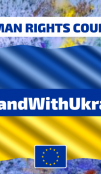EU & High-Level Panel on Internal Displacement: Ensuring life-saving assistance and longer-term support to IDPs in the face of COVID-19

Closed borders, lockdowns, as well as control over medical supplies have complicated the delivery of humanitarian assistance to IDPs and other vulnerable populations, who were already in need of urgent support before the current pandemic. IDPs are particularly exposed to the health and socio-economic impacts of COVID-19: living in crowded camps or informal settlements, many have no possibility of applying social distancing measures, accessing health services or simply washing hands.
https://twitter.com/EU_UNGeneva/status/1268465492404121603?s=20
To respond to these tremendous challenges, the UN Secretary-General Antonio Guterres initiated the High-Level Panel on Internal Displacement in February 2020. "At that time, the coronavirus wasn’t on anyone's radar. However, it became clear very quickly that COVID-19 has a particular impact on the most vulnerable, including IDPs," shared Ms. Federica Mogherini, Co-Chair of the Panel. "The pandemic had an immediate effect on the work of the Panel, stopping us from speaking directly with IDPs. Still, the Panel continued its work by partnering with UN agencies and NGOs to organize consultations with IDPs in several countries."
https://twitter.com/Idps_Panel/status/1268472982722281473?s=20
As the pandemic is deepening inequalities around the world, IDPs are particularly affected: "The coronavirus shows how collectively vulnerable we all are and the importance of solidarity. Particularly many countries in Africa need urgent support to get through this crisis," underlined Mr. Donald Kaberuka, Co-Chair of the Panel on Internal Displacement and Special Envoy of the African Union on COVID-19.
https://twitter.com/EU_UNGeneva/status/1268497422235377665?s=20
Maimouna Alammar's shared her personal story, representative of millions around the world: forcibly displaced with her two children from Easter Ghouta to Idlib in Syria, she stresses the double impact of conflict and pandemic on families. "What happened to me and my family is just another episode of what is happening for thousands. In displacement, uncertainty is already overwhelming" and current COVID-19 measures add an extra layer of complexity to families, children, parents.
https://twitter.com/EU_UNGeneva/status/1268483866047795200?s=20
Jan Egeland of the Norwegian Refugee Council (NRC) shared his NGO's experience from the field as one of the main humanitarian organization active in various displacement and refugee contexts: "The socio-economic consequences for the IDPs are already devastating. Most governments are not helping. People are not protected and too many IDPs are not allowed to fully integrate nor able to return home safely." The EU works closely with partners, such as NRC, integrating immediate humanitarian aid and longer-term development assistance to create more durable solutions, explained EU Ambassador in Kenya, Simon Mordue. The Ambassador urged to look for innovative approaches and to think outside the box, as he shared some of the EU's good practices in its work with UNHCR and WFP in Kalobeyi.
https://twitter.com/Idps_Panel/status/1268493197568860160?s=20
As the Special Rapporteur on the Human Rights of IDPs, Cecilia Jimenez-Damary, called for a more human rights-based approach, she stressed that "this means that people must be in the centre." She specifically highlighted the impact of COVID-19 on the lives of internally displaced children: "Children experience displacement very differently because of their vulnerability and dependency." Mr. Benjamin Burckhart from the World Bank added that there is not "one size fits all" solution and in the current context, solutions need to balance the economic consequences of containment measures with the health perspective.
https://twitter.com/Idps_Panel/status/1268493197568860160?s=20
All panellists agreed that we can take this crisis as an opportunity to enhance coordination in the humanitarian and development nexus, invest in preparedness, strengthen national public health capacities, and include the most vulnerable, such as IDPs, in national response programs. The importance to hear IDP's voices, such as Mimouna's, was seen as essential to be able to respond to their immediate needs. The impact of the pandemic will figure in the work of the Panel on Internal Displacement and the Panel can count on the EU's support.





